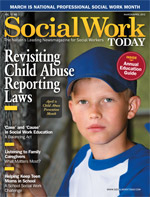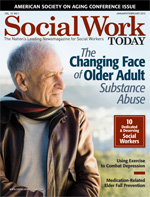2012 Article Archive
November/December 2012 Issue
 FEATURES FEATURES
Tech-Savvy Older Adults — Staying Connected, Challenging Stereotypes
Older adults are using technology to stay involved socially, with family, and with caregiving resources.
Treating Professionals With Substance Use Disorders
Help professionals face special challenges in recovery from substance use disorders.
Sibling Sexual Abuse — Uncovering the Secret
Sibling incest is often unrecognized by families, professionals, and even victims.
School-Based Adolescent Mental Health Programs
Supplementary teams of community mental health professionals can assist schools with early identification and treatment of adolescent mental health conditions.
DEPARTMENTS
Editor’s Note
Challenging Age-Based Stereotypes
Addictions Advisor
Teen Pot Use Leaves Lasting Mental Deficits; Drug Program HIV Testing Effective
Mental Health Monitor
The Impact of Infertility
Aging Advocate
Redefining Aging
Social Services Directory
Datebook
September/October 2012 Issue
 FEATURES FEATURES
Supporting Social Work Students With Mental Health Challenges
Graduate and undergraduate schools of social work discuss how they are addressing student mental health challenges.
Pain Care Advocacy in an Era of Opioid Abuse
Pain medication abuse is affecting individuals with legitimate needs to manage chronic pain. Learn how social workers can advocate for them.
Social Media and the Postadoption Experience
Social workers can help adoptive parents prepare for the possibility of children connecting with birth parents through social networking sites.
End-of-Life Care With Families of Addiction
Addiction can make end-of-life care even more challenging for many families.
DEPARTMENTS
Editor’s Note
Back to School ‘Issue’
Evolving Education
Strong Families Strong Forces
Addictions Advisor
Yoga as Adjunct Therapy for Substance Use
Datebook
Technology Trends
Assistive Technology for People With Disabilities
July/August 2012 Issue
 FEATURES FEATURES
Complicated Grief — Does It Belong in DSM-5?
Most clinicians agree that complicated grief exists, but controversy has arisen over whether this state of prolonged mourning warrants DSM-5 classification as a separate disorder.
Synthetic Drugs — Fake Substances, Real Dangers
With many of these drugs still legal and easily available, the risks of physical harm and death are rapidly rising.
Couples and Binge-Eating Disorder
Binging on food behind closed doors by one (or both) partner(s) is a behavior than could strain any couple’s relationship.
Pure Obsessional OCD — Symptoms and Treatment
Individuals with this condition often practice repetitive mental rituals to counteract what they believe are evil or psychotic thoughts.
DEPARTMENTS
Editor’s Note
It's Complicated
Aging Advocate
Messages From 24/7 Care Persons
Datebook
May/June 2012 Issue
 FEATURES FEATURES
Mobile App Technology for Social Workers
As the world goes mobile, social workers are recognizing the capabilities of this technology in their field.
Acceptance and Commitment Therapy for Veterans With PTSD
A therapy that helps veterans accept the horror of their combat experience and still commit to changing thoughts and behaviors may be a good fit for those with PTSD.
Helping Families Through Dementia Care-Related Conflicts
Decisions about the care of a loved one with dementia can exacerbate ongoing family issues. Social workers can help diffuse the conflicts and foster cooperation.
Trauma-Focused Cognitive-Behavioral Therapy — Hope for Abused Children
TF-CBT encourages children to freely express themselves about all aspects of their trauma and involves parents and other caregivers in the recovery process.
DEPARTMENTS
Editor’s Note
Social Work—There’s an App for That?
Evolving Education
Becoming a Successful Field Instructor
Addictions Advisor
Supervisor Training Helps Curb Employee Substance Abuse; Tweens Just Say Maybe to Cigarettes and Alcohol; Ecstasy Drug Produces Lasting Toxicity in the Brain
Aging Advocate
Aging With HIV/AIDS
Datebook
March/April 2012 Issue
 FEATURES FEATURES
Revisiting Child Abuse Reporting Laws
Headline-grabbing child abuse cases often spark interest among legislators in reforming reporting laws, but experts caution against knee-jerk reactions if child welfare systems cannot support or implement changes effectively.
‘Case’ and ‘Cause’ in Social Work Education — A Balancing Act
Schools of social work offer both micro and macro curricula. Students and social workers must balance their recognition of both approaches as important to the history and practice of the profession.
Keeping Teen Moms in School — A School Social Work Challenge
Social workers in dedicated school-based programs for teen mothers discuss what helps prevent students from dropping out.
Listening to Family Caregivers
Family caregivers express their thoughts and feelings about the frustrations and rewards of caring for a family member and how professionals can best support them.
DEPARTMENTS
Editor’s Note
Social Work Matters
Mental Health Monitor
Residential Treatment — When to Consider It, What to Look For
Children and Families Forum
Aging Out of Foster Care
Evolving Education
News from Boston College, the Brown School at Washington University in St. Louis, and Wheelock College
Aging Advocate
Hearing Loss Linked to Three-Fold Risk of Falling; New Phone Line Offers Free Advice on Memory Loss, Dementia
Addictions Advisor
Education Guide
Health Matters
Datebook
January/February 2012 Issue
 FEATURES FEATURES
The Changing Face of Older Adult Substance Abuse
As drug and alcohol abuse becomes a growing problem among older adults, social workers must be aware of the health risks and ask some tough questions.
Medication-Related Elder Fall Prevention
Older adults often take multiple medications with side effects that put them at risk for falls. Know what medications are in your clients medicine cabinet and how they may increase this risk.
10 Dedicated and Deserving Social Workers
Social Work Today honors exemplary social workers nominated by their peers for their accomplishments and commitment to the profession.
Using Exercise to Combat Depression
More people are finding that adding exercise to a depression treatment regimen makes sense, and research is showing that it works.
DEPARTMENTS
Editor’s Note
Do Ask, Do Tell
Technology Trends
Texting to Improve Medication Adherence
Aging Advocate
Older Inmates Adjust to Life Outside Prison
Datebook
|

 FEATURES
FEATURES FEATURES
FEATURES FEATURES
FEATURES FEATURES
FEATURES FEATURES
FEATURES FEATURES
FEATURES